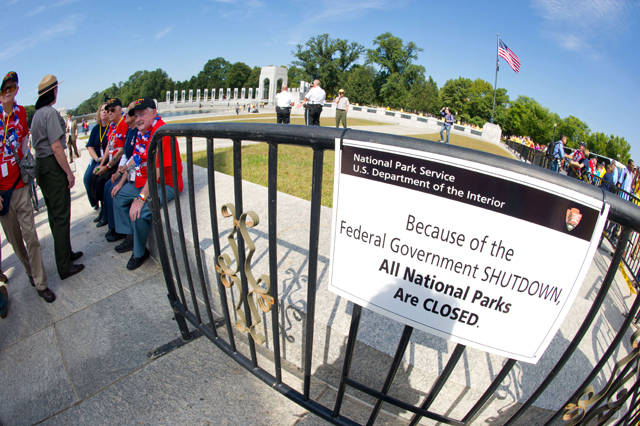As the government “shutdown” drags on, Washington’s National Mall remains closed to the general public. Not everyone, however, is forbidden to set foot on the mall. The National Park Service (NPS) has posted signs indicating that certain portions of the mall are closed “except for 1st Amendment activities.”
A planned immigration rally also took place on the mall on Tuesday with NPS approval. Susana Flores, a spokesperson for Camino Americano, a group that organized the rally, told the Washington Examiner that the NPS allowed the event to take place under the group’s rights granted by the First Amendment.
Ironically, in posting these signs, NPS has violated the Constitution. Americans may not be forced to guess at what they can do on government property—on pain of fines and jail time if they guess wrong.
Restrictions on speech on public property have inspired a highly complex body of case law. The National Mall is a “traditional public forum.” To borrow from Perry Educational Association v. Perry Local Educators’ Association (1983), the mall “by long tradition or by government fiat has been devoted to assembly and debate.”
As with any traditional public forum, the government may restrict the time, place, and manner of expression on the mall if the regulations are content-neutral, are narrowly tailored to serve a significant government interest, and leave open other channels of communication. In Clark v. Community for Creative Non-Violence (1984), the Supreme Court upheld an NPS regulation that prohibited camping in sleeping bags in Lafayette Park and the National Mall in connection with a demonstration, citing the NPS’s “legitimate interest in ensuring that the National Parks are adequately protected” and finding that the regulation was content-neutral and narrowly tailored to that interest.
But to tell people that they’re free to engage in “1st Amendment activities” is to tell them nothing at all, unless they’re familiar with a complicated area of constitutional law. They must guess.
Taken literally, the signs suggest that one can do just about anything. According to the Supreme Court’s holding in Airport Commissioners v. Jews for Jesus, Inc. (1987), even talking and reading qualify as “1st Amendment activities.”
What’s the penalty for guessing wrong? Although the NPS hasn’t clarified what it will do to those who walk on the mall without expressing themselves in a permissible way, officials have issued trespassing citations to those whom they have come across in the Grand Teton and Yellowstone National Parks. Trespassing in a national park carries a maximum fine of $500 and up to six months in jail.
So long as it specifies what regulations apply—and so long as those regulations are reasonable time, place, and manner restrictions—the NPS can, consistent with the Constitution, restrict speech on the mall. But the NPS cannot force Americans to guess at what speech is okay and what’s not. When the government limits expression and can fine and jail those who stray from those limits, it must speak in terms that non-lawyers can understand.































